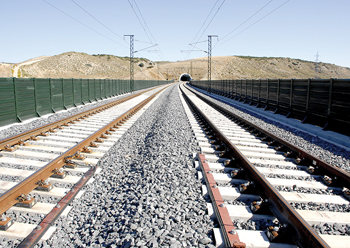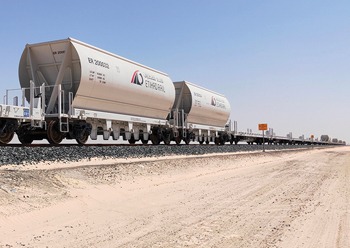
 Etihad Rail network ... work on Phase Two is more than 75 per cent complete.
Etihad Rail network ... work on Phase Two is more than 75 per cent complete.
Work on the UAE National Rail Network is progressing at an accelerated pace, with more than 75 per cent of the construction completed on Stage Two of the project since its launch some 28 months ago, according to Engineer Shadi Malak, CEO of Etihad Rail, the developer of the integrated railway network.
Speaking at the Middle East Rail event last month, Malak said: “We are in a privileged position that we can change the face of logistics and mobility in this country, helping to connect industries, businesses and people, supporting tourism, whilst establishing rail as a cornerstone of the UAE’s overarching initiatives.”
The ambitious AED50-billion ($13.6 billion) Etihad Rail project aims at establishing integrated system for transporting goods and passengers across the UAE. Currently a freight service, passenger services will be introduced to connect 11 cities within the UAE from Al Sila to Fujairah, allowing travel on trains travelling at speed of 200 km/h from Abu Dhabi to Dubai in 50 minutes, and from Abu Dhabi to Fujairah in 100 minutes. By 2030, the number of passengers is expected to reach more than 36.5 million annually.
Stage One of the 1,200-km network – which extends across the UAE, from the border of Saudi Arabia to the border of Oman – began operations in 2016. This 264-km stretch has helped transport some 42 million tonnes of granulated sulphur from Habshan and Shah to Ruwais on behalf of Adnoc, resulting in some 2.55 million trucks being removed from the road, saving both costs and reducing environmental pollution.
Work is now well underway on multiple fronts on Stage Two, which extends the network by another 605 km from the border with Saudi Arabia at Ghuweifat, connecting the Emirates via Abu Dhabi, Kizad, Khalifa Port, Jebel Ali Port, Dubai, Sharjah, Ras Al Khaimah and thence to Fujairah on the east coast.
Currently, some 27,000 workers are engaged on some 3,000 construction sites across the UAE, and have already completed 100 million manhours on site so far.
Among such projects, work is in progress on a 600-m-long multi-span bridge in Al Bithnah, Fujairah, which will be the UAE’s highest railway bridge. Construction of the network in the Northern Emirates calls for the construction of 54 bridges and nine tunnels across the Hajar Mountains, and extends over 145 km through Sharjah, Fujairah and Ras Al Khaimah.
Package A, which covers 139 km, has been completed and involved the excavation of nine tunnels extending over 6.9 km and the main 256-km rail line between Dubai and Abu Dhabi. This milestone was marked in early March, when HH Sheikh Maktoum bin Mohammed bin Rashed Al Maktoum, Deputy Ruler of Dubai, Deputy Prime Minister, Minister of Finance, and HH Sheikh Theyab bin Mohamed bin Zayed Al Nahyan, Member of the Executive Council, Chairman of Abu Dhabi Crown Prince’s Court and Chairman of Etihad Rail, fastened the last two bolts of the mainline connection between Abu Dhabi and Dubai.
As part of the support facilities on the rail network, Etihad Rail will build an advanced freight terminal at Dubai Industrial City (DIC) spread across 5.5 million sq ft and with a capacity of 5 million tonnes, linking manufacturing centres and warehouses in DIC.
Also being built is an aggregates dry port freight facility, which will streamline transportation of raw materials across the UAE railway network, with each train capable of carrying more than 7,000 tonnes of limestone from the Northern Emirates to the Industrial City of Abu Dhabi and Dubai Industrial City.
As construction is ongoing on this phase, Etihad Rail continues to pursue strategic partnerships with a range of key entities. Among the latest of such partnerships, it has signed MoUs with three major European companies – Renfe, Spain’s national railway operator, High Speed 1, the first high-speed railway in the UK, and GB Railfreight, the British rail freight company – mainly aimed at exchange of knowledge, expertise and best practices in freight and passenger rail services and operations.
Locomotives on the UAE rail network are equipped with advanced emission reduction technology to cut carbon emissions by 70 to 80 per cent. A single freight train can transport the same amount of goods as up to 300 trucks.

















.jpg)













 (1).jpg)













































